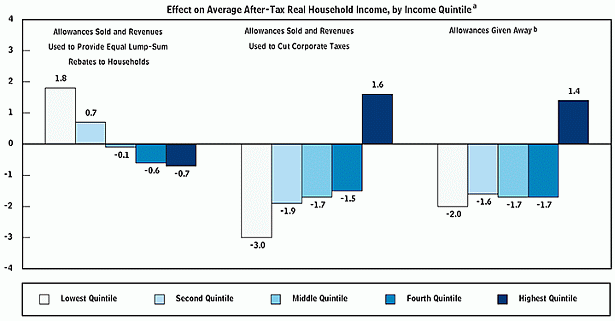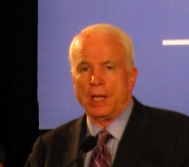I see John McCain is upset by the fact that Obama wants to auction 100% of cap-and-trade permits. He wants the vast bulk of the permits to be given away to businesses.
There are lots of complicated, obscure issues around carbon policy, but this is not one of them. Let’s be very very clear about what this means: McCain favors the interests of industry over the interests of consumers.
This is the giveaway quote: “At this time of economic hardship, it is beyond irresponsible to further raise costs of the operation of this country’s businesses.”
The alternative, of course, is to raise the cost of living for consumers. It’s a clear cut choice.
First, let’s clear up a common confusion. McCain says that auctioning permits will “allow for little or no transition into a low-carbon system.” That is straightforwardly false: the cap forces a low-carbon system. The cap does the environmental work. How the permits are allocated is not an environmental issue, it’s an economic issue. It’s about distribution — who pays.
Someone will pay. When the price of emitting CO2 rises, someone pays the increased costs. If costs are raised and no further action is taken, fossil energy providers and fossil-intensive manufacturers will pass along the increased costs — consumers will pay. Giving permits away will not prevent this — consumer costs will rise whether permits are auctioned or given away.
If the government auctions the permits, it raises revenue with which it can offset or erase the burden on consumers: through direct rebates, through investments in energy efficiency (which lower power bills), through investments in clean power that accelerate its availability.
If the government gives away the permits, businesses raise prices anyway, reap enormous windfall profits, and consumers bear the full burden. That’s what McCain wants.
I return again to this graph from the Congressional Budget Office:
 From March 2009 CBO testimony to Congress
From March 2009 CBO testimony to Congress
This charts the distributional consequences of auctioning vs. freely allocating permits. On the left, auctioning. On the far right, freely allocating. (For more, see this post.) As you can see, auctioning (and transferring the value to consumers) benefits the poor and working class, while putting most of the cost burden on upper income quintiles. Giving away permits puts the burden on the bottom four quintiles and overwhelmingly benefits the most wealthy.
That’s what McCain is advocating for: a system that primarily benefits the very wealthy.
Don’t be misled by all the rhetoric: This is a classic dispute between the left, which thinks economies prosper when more wealth is in the hands of the poor and middle class, and the right, which thinks economies prosper to the extent they benefit the rich.



